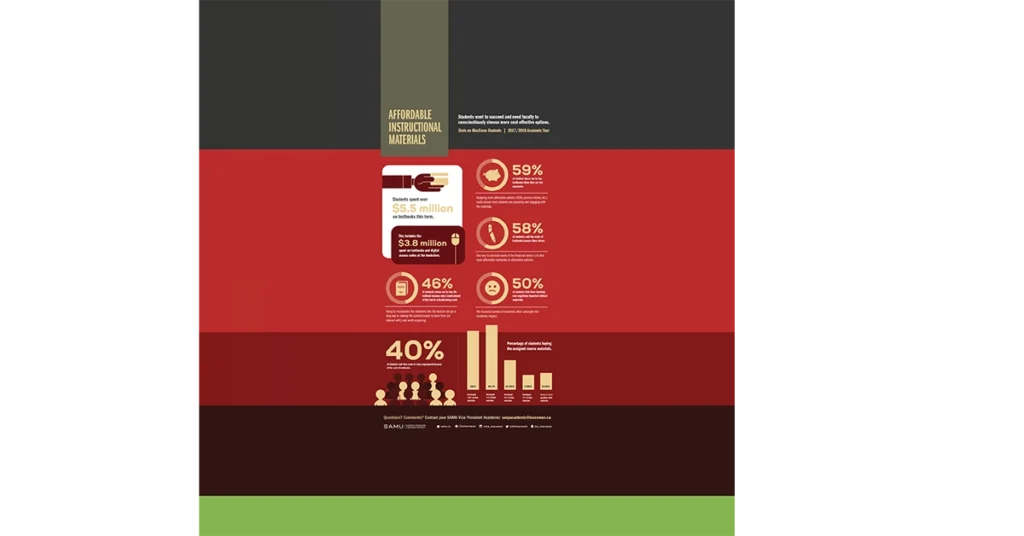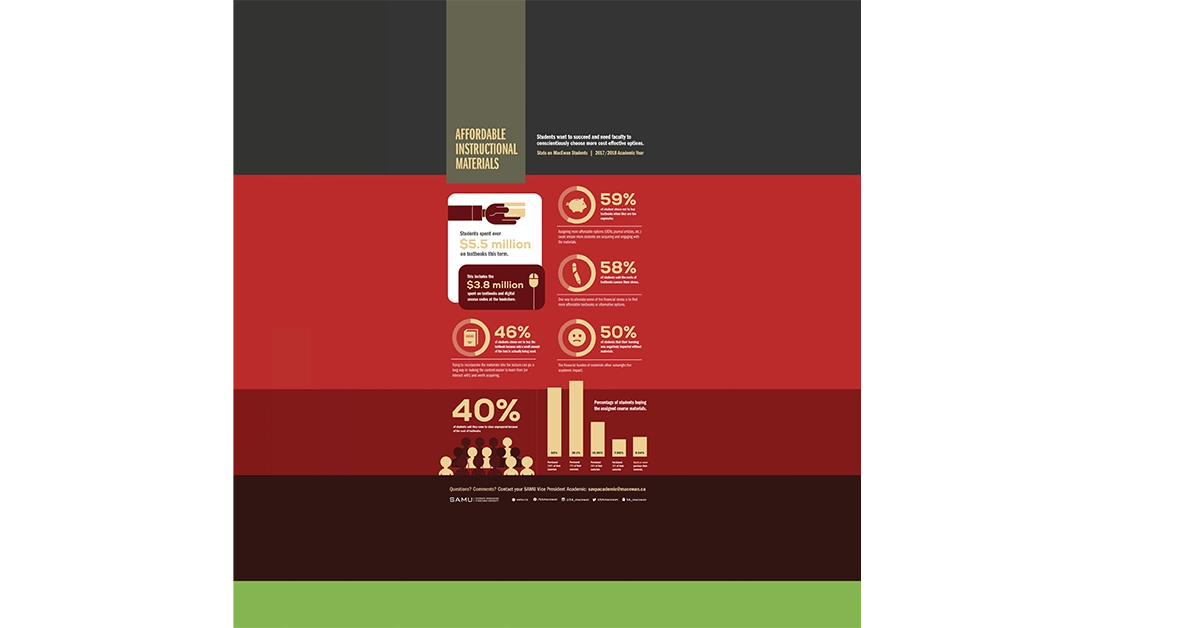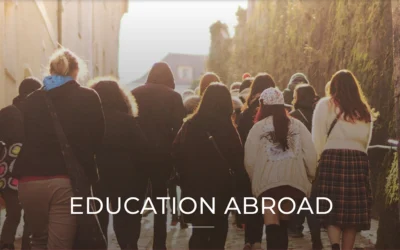There are a lot of reasons some modern university students are choosing not to purchase textbooks. The books are expensive, heavy, and often not used enough in class to justify the purchase, and sometimes the information in them is either out of date or incorrect.
There is no doubt that information is a commodity, and in the era of Google, correct information is an especially valuable one.
Textbook companies know this and have done a good job of growing and shaping an education system that is heavily reliant on them. That’s why in subsequent editions of textbooks, much of the information provided isn’t new, it’s just mixed around enough to make sure that the earlier editions are unusable.
In many cases, however, information new enough to warrant publishing an updated version of a text has often already been released on the internet for free.
In a recent survey conducted by the Students’ Association of MacEwan University, 59 per cent of students chose not to buy their textbooks because they were too expensive, and only 32 per cent purchased all of their required class materials.
This is an incredibly high percentage considering that students at MacEwan spent $5.5 million on textbooks last term. As far as educational resources go, textbooks are underused and, perhaps, overvalued.
Josh DeRose, a journalism student at MacEwan University, says that he rarely, if ever, buys his textbooks. He cites several reasons for this choice, the main one being the inflated cost of textbooks. Sometimes it’s possible to pass a class without the book.
“The reading of that week doesn’t necessarily dictate your ability to contribute in class,” DeRose says.
He also mentions times when it was useful to have the book.
“I remember in my second semester here, I took (an introductory psychology course) and I didn’t bother buying the textbook because I was on a hot streak of not needing one, and yeah, you definitely need the textbook to have any success in that class,” he recalls.
“If you can afford the textbook, take the opportunity to buy it.”
The most expensive book currently for sale in the MacEwan bookstore is Handbook of Human Logistics — Transportation in International Supply Chains. It is the required text for a senior-level supply chain management class.
A new copy costs $405, but students can purchase it used, when available, for $303.75. The estimated cost per credit for a bachelor of commerce degree, according the the MacEwan website, is $154. Most classes are worth three credits, so a BCom student will end up paying $462 for the class and $406 dollars for the book. This ends up being $868 for a class that will be attended for a single semester.
For many students, that cost is unrealistic. It is hard to justify buying a colourful paper brick that will only be used for a few months when that same money could be used to buy basic life necessities.

Some professors do try to address this problem. Brian Gorman and Neil Fitzpatrick, journalism professors with MacEwan’s bachelor of communication studies program, say that they intentionally choose cheaper books for their classes or find other solutions for readings.
“If there’s a way of finding a textbook that’s less expensive and still has the content that I want, and that the students need, then I’ll do that,” Fitzpatrick says. The required text for his online journalism class costs $24.95 at the university’s bookstore, and digital copies are available online for even less.
Gorman too, when assigning texts, considers a book’s value, but as an investment for the students in his classes. Holding up a copy of Interviewing: The Oregon Method, priced at just over $30 new, he says that he picks books that are useful to students both in and out of the classroom.
“A lot of students expect you to teach the textbook, and that’s not the way it’s supposed to work. You’re supposed to read the textbook,” says Gorman.
If we categorized all textbooks into a Venn diagram of affordability and relevant information, it would ideally be a single circle. Unfortunately, it seems like textbooks are intentionally written for one of those purposes or the other.
Professors shouldn’t have to make the choice between whether the books are useful or inexpensive, and students shouldn’t be forced to sacrifice the quality of their education, which they’re already paying for, by not being able to afford texts.
Textbooks are marketed as essential, and in a lot of cases they are, but are priced like luxury items. Paying extravagant amounts of money for a resource that was intentionally written to be obsolete in a few years is a little like buying a Fastpass at Disneyland: you don’t have to buy it to do what you’re there to do, but the cost makes the experience a little easier.
The difference is that a post-secondary education takes years, and tuition alone costs students between $2,500 and $6,500 per year. Full-time students paid an average of $16,600 for tuition, fees, living expenses, and books in the 2014-2015 school year, according to the Government of Canada website. Also, it is unlikely that anyone has ever called any post-secondary institution “the happiest place on earth.”
Textbooks are a tradition in academia, but they are a tradition that is quickly becoming impractical. Most disciplines that change enough to justify a new edition of a text could potentially replace updated chapters or topics with articles from online academic journals, which university students already have access to through libraries.
A bag full of books can be at least partially substituted for free online sources, or cheaper digital versions of a textbook. Whether or not students can afford to buy paper textbooks doesn’t have to be an issue, and shouldn’t be, especially if most of the information is something they’re already paying for elsewhere.
Graphics supplied.





0 Comments